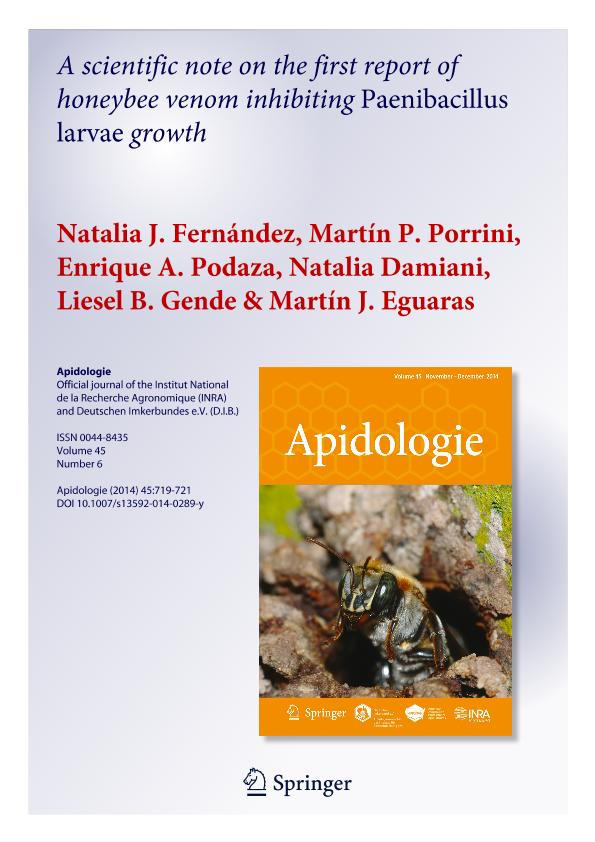Artículo
A scientific note on the first report of honeybee venom inhibiting Paenibacillus larvae growth
Fernández, Natalia Jorgelina ; Porrini, Martín Pablo
; Porrini, Martín Pablo ; Podaza, Enrique Arturo
; Podaza, Enrique Arturo ; Damiani, Natalia
; Damiani, Natalia ; Gende, Liesel Brenda
; Gende, Liesel Brenda ; Eguaras, Martin Javier
; Eguaras, Martin Javier
 ; Porrini, Martín Pablo
; Porrini, Martín Pablo ; Podaza, Enrique Arturo
; Podaza, Enrique Arturo ; Damiani, Natalia
; Damiani, Natalia ; Gende, Liesel Brenda
; Gende, Liesel Brenda ; Eguaras, Martin Javier
; Eguaras, Martin Javier
Fecha de publicación:
04/2014
Editorial:
EDP Sciences
Revista:
Apidologie
ISSN:
0044-8435
Idioma:
Inglés
Tipo de recurso:
Artículo publicado
Clasificación temática:
Resumen
In the eusocial honeybee, Apis mellifera, worker bees use a stinging apparatus for defense. The sting is upplied with venom by glands localized in the abdomen. Honeybee venom (BV) is composed of at least 18 bioactive molecules, ranging from biogenic amines to proteins whose structure and function have been largely determined. These include peptides such as melittin, apamin, adolapin, and mast cell degranulating peptide; biologically active amines; enzymes as phospholipase A2 (PLA2); and a few nonpeptide components (Peiren et al. 2005;Matysiak et al. 2011).Melittin and PLA2 are the most abundant proteins, representing 50 and 12 % of BV dry weight, respectively. This research also constitutes the first record of oral administration of BV to an invertebrate biological model. No lethal or behavioral effects on bees after a week of ingesting BV were revealed. High doses of BV proved much less toxic for bees than some botanical extracts (Damiani et al. 2014). Further studies should be conducted to determine the toxicological risks and the optimum dosage of BV or the use of single antimicrobial peptides (i.e., Melittin) for field assays. BVextraction has become a standardized practice, characterized for being safe, simple, and causing no harm to bees. It would be interesting to investigate its effect on other apicultural diseases.
Palabras clave:
Honeybee Venom
,
Paenibacillus Larvae
,
Antimicrobial Activity
,
Apis Mellifera
Archivos asociados
Licencia
Identificadores
Colecciones
Articulos(CCT - MAR DEL PLATA)
Articulos de CTRO.CIENTIFICO TECNOL.CONICET - MAR DEL PLATA
Articulos de CTRO.CIENTIFICO TECNOL.CONICET - MAR DEL PLATA
Citación
Fernández, Natalia Jorgelina; Porrini, Martín Pablo; Podaza, Enrique Arturo; Damiani, Natalia; Gende, Liesel Brenda; et al.; A scientific note on the first report of honeybee venom inhibiting Paenibacillus larvae growth; EDP Sciences; Apidologie; 45; 6; 4-2014; 719-721
Compartir
Altmétricas



